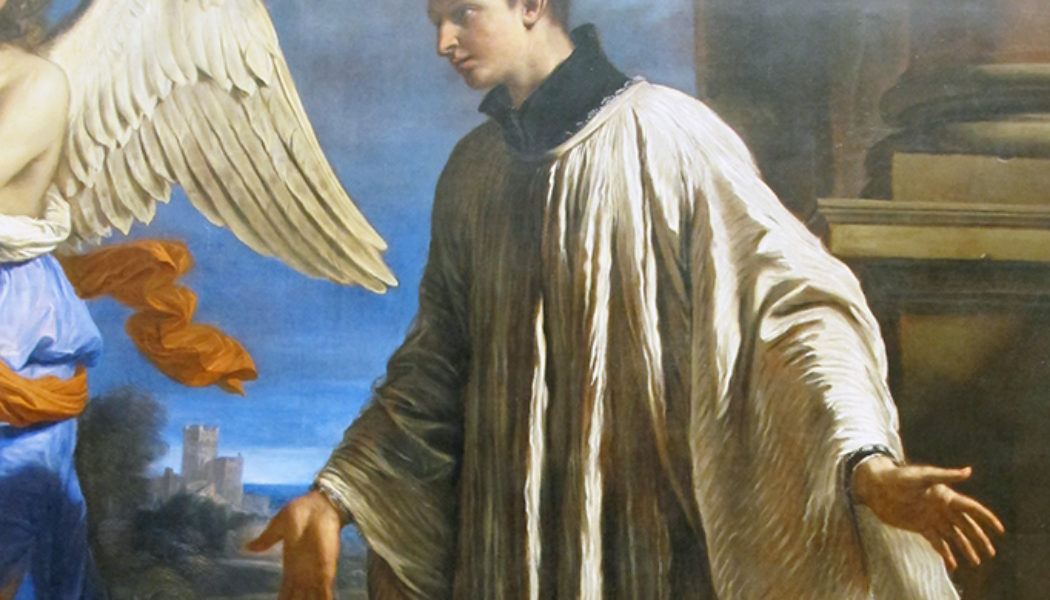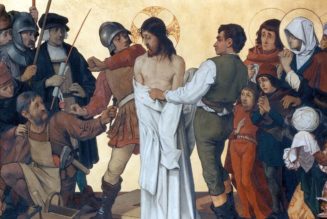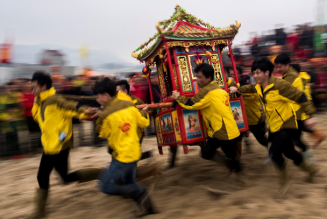
Gratitude to God frees us from sin.
Being the son of a wealthy and powerful parents in the height of the Renaissance comes with a ton of responsibility. It also comes with a fair amount of privilege. If that family is among the most famous in Europe, everything you do and say makes an impact. Aloysius Gonzaga (1568-1591), better known by his peers as “Luigi,” perhaps didn’t quite understand that dichotomy at an early age.
His father, Ferrante, was a marquis of the Spanish army occupying the northeastern part of Italy at the time, and was frequently gone for war councils and battles all over the known world. He loved his firstborn, Luigi, and wanted to make a military man out of him, and so resolved to have the boy come along on a campaign. Martha, who prayed that her son would become a religious, all but refused the request but relented. Little Luigi went to war at about 6 years old.
The boy was overjoyed to join dad on one of these adventures and to hallmark the occasion, the marquis gave him a toy gun. Toys were different back then — don’t mistake this as a run-of-the-mill wooden gun. It was more like a mini hand cannon! Taking real beads and gun powder, it was a real weapon if used properly. His father gave him one rule: use only when supervised.
And like kids usually do, he took that rule and threw it in the garbage.
Remembering how his father taught him to reload, he did his best and took aim at the stack of hay in the barracks. BLAMM! Luigi loaded far too much gunpowder and nearly took his hand — or arm — completely off.
Ferrante knew he had to punish the usually well-mannered boy, and he did. What would most kids do? Try again!
Oh, but Luigi wasn’t most kids. He was a marvel of uniqueness. Only he would choose to go from toy hand cannon, to real cannon. He was bent on regaining his repute at any cost.
In the middle of the night Luigi got out of bed, got himself dressed and snuck to the ammo bunker. Emerging with a ball that he could hardly lift, he made it to the gunpowder cache and grabbed enough for a single attempt.
“WAKE UP! WAKE UP! PREPARE FOR BATTLE!”
The entire camp awoke in confusion to the noise of a heavy, loud boom, thinking the enemy had somehow penetrated their lines and was firing their own equipment on them! But confusion turned to astonishment when they found the little boy, nearly dead and concussed, lying next to the cannon — he had taken the full brunt of the recoil to the chest. Rushing to the scene armed with his men, Ferdinand found not only that it was his son who had fired the cannon, but that the recoil had not killed him. In fact, the boy was almost completely unharmed.
What was Ferrante to do? Luigi went unpunished only because the multitude of soldiers admired the little child and talked the marquis out of any further action. They absolutely loved him.
As amusing as the story is, it marked a turning point for the future saint. From then on, he resolved never to be disobedient again. Indeed, he resolved never to sin again. And from then on, his reputation for piety became world famous. He almost never spoke unless it was with the utmost respect and he achieved an utter perfection in self-mastery when met with a hint of temptation. This once caught the eye of King Philip of Spain. One day, the king made a humor after realizing that the young man at court never once made eye contact with other women in the dining hall.
If he was not a perfect child, St. Aloysius Gonzaga is nonetheless known to be one of the most pious, sinless examples of a Christian life, such that cause for his canonization was sought immediately after his death at just 23. His life changed after firing that cannon — realizing, doubtless, that his survival was a miracle. From then on, the only army he wanted to serve was the one battling the spiritual realm.
It is truly gratitude that frees us from sin.
St. Aloysius Gonzaga, pray for us.
This article originally appeared June 21, 2019, at the Register.
Join Our Telegram Group : Salvation & Prosperity








